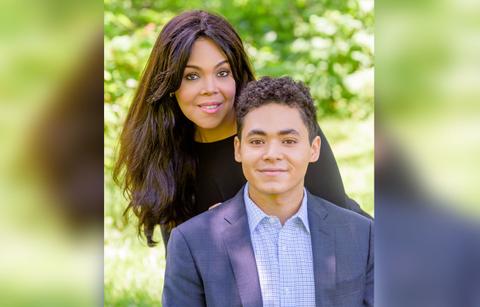Racial Inequality 'Stoked' Muhammad Ali's Fire, Gave Late Boxing Great 'Motivation' To Always Win, Says Daughter
Muhammad Ali was one of the greatest boxers and athletes the world has ever seen — but more than that, he was a humanitarian and activist against racial inequality as well as a loving father and grandfather.
Muhammad’s daughter, Khaliah Ali, and grandson, Jacob Ali Wertheimer, sit down with OK! on the five year anniversary of the three-time heavyweight champion’s death and discuss the legacy he left behind.

The world-renowned boxer grew up in a time of racial segregation, discrimination and inequality; however, Muhammad never allowed the hatred and negativity of others hinder his own success and personal growth.
“It gave my father motivation,” Khaliah says of the racism and lack of respect Muhammad experienced in the still-segregated South despite being an Olympic gold medalist who was honored and praised throughout the world. “It gave him the will to succeed, and he turned what was hate or doubt or disbelief into love of himself and belief in himself.”
Khaliah candidly adds that the racism and disrespect only “stoked his fire” and made it that more important for him to never lose. It “made him even more focused on the larger issue of what was happening in the country at the time with his people, but also as an individual, he would not lose,” she insists.

While looking back on the impact Ali — who died of respiratory complications related to Parkinson’s Disease at age 74 — had on others, Jacob, 22, notes that the boxing legend used his platform to help. He was a voice for those who had been silenced in this world.
“My grandfather came up in a time in which African Americans, specifically in this country, were told that they're not beautiful, that they are not great. And he stood up, and he called himself beautiful and he called himself 'The Greatest,'” Jacob says referring to his famed nickname.
The recent Harvard graduate explains that Muhammad did not call himself “The Greatest” due to his own overwhelming success, but because it was “a statement for the entire community of people of this world who are told that they are lesser,” he continues.
And while Ali, known for his ability to float like a butterfly around his opponents, was savage in the ring, he embodied love and kindness towards others when the gloves came off. “Love truly does embody the essence of who he was,” Khaliah — who is actively involved in various civil and human rights and environmental projects — insists.
- Racism & Heartbreak: Muhammad Ali’s Struggles With Racism After Olympic Win
- Tom Brady Shares Telling Quote About a 'Lying Cheating Heart' More Than a Year After His Divorce From Gisele Bündchen
- Boxing Legend Leon Spinks, Who Beat Muhammad Ali, Dead At 67 After Cancer Battle — See The Touching Tributes
One of her many projects includes putting a spotlight on the destructive environmental issues in Africa’s diamond mining regions. “If you saw what diamond mining does to the environment; how many workers’ human rights are violated, you might think twice about buying diamonds," she says, noting: "this year’s announcement by Pandora, the world’s largest jeweler, that it will stop selling earth diamonds and replace its inventory with lab-grown diamonds, is a monumental move.”
The 47-year-old adds that because Muhammad was able to love himself, it allowed him to love others.
Reflecting on her own childhood, Khaliah says the overwhelming amount of love she received from her father and the public due to who her dad was led to her own misconceptions about the kindness of others in the world.
“As a child, I always told people it was the greatest blessing to have a father like him because I was always preceded by love,” she begins to explain. “It almost gave me a false illusion of how the world was at a certain point in my life because everybody approached you so lovingly because of the love they had for my father regardless of their socioeconomic background, nationality, race, religion or origin.”
And when it came to the later years of Khaliah’s life with her dad, Muhammad faced his most challenging fight with Parkinson’s Disease. Despite speculation of a connection between his diagnosis and the damage done to his brain from his three decades in the ring, doctors have been unable to come to a definitive conclusion.
When asked if Khaliah thinks Muhammad — born Cassius Marcellus Clay — would have done anything differently in his career if he knew of the possible correlation, she immediately replies: “I think my father was called by forces greater than him.”
She says she can’t answer for him but assumes “that nothing would have stopped him on his path to his own personal greatness and his fight for the liberation of his people.”
On June 3, 2016, the world was silenced when the heavyweight champion died in a Scottsdale, Ariz., hospital following his 1984 Parkinson’s diagnosis. Seven days later, 100,000 people from around the world gathered in Louisville, Ky., to honor and remember “The Greatest” at his procession — which had been pre-planned by himself and Khaliah's step mom, Yolanda "Lonnie" Williams.
The documentary City of Ali hones in on that one monumental day, showing how his hometown united to celebrate his death. “There are so many documentaries on my father and this one is very unique because it really focuses on that one single day and all the dynamics that swirl around it,” Khaliah says of the film. “It was a fascinating documentary.”
Jacob adds that the film — which chronicles Muhammad’s life and days leading up to his death — emphasizes the importance of Louisville in his grandfather’s life. “I think it shows just how much that city resonates with him and loves him and cherishes him and how much love he had for the city as well,” he concludes.

